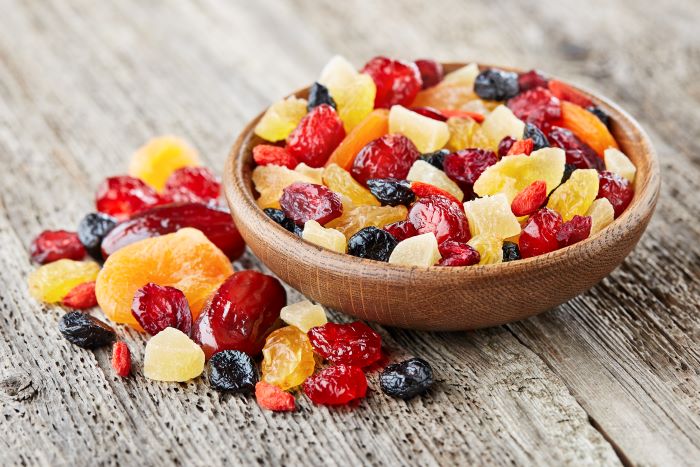In the realm of snacking, one can easily get caught in the never-ending array of options that seem to offer something quick, good, and—above all—convenient. But many of us turn to dried fruit while trying for a better choice. But not all dried fruits are made similarly, particularly with relation to sugar count. Although many dried fruits are loaded with preservatives and extra sugars, sugar-free dried fruits are far better for you.
As more people search for simple, nutritious snacks that fit a healthy lifestyle, sugar-free dried fruit has become rather popular. Sugar-free dried fruit can be a game-changer whether your goals are to simply choose healthy snacks or cut less on sugar for health concerns. The advantages from boosting energy to encouraging weight loss are many. Let us so explore the ten unexpected advantages that will permanently alter your diet!
1. What Are Dried Fruits Without Sugar Added?
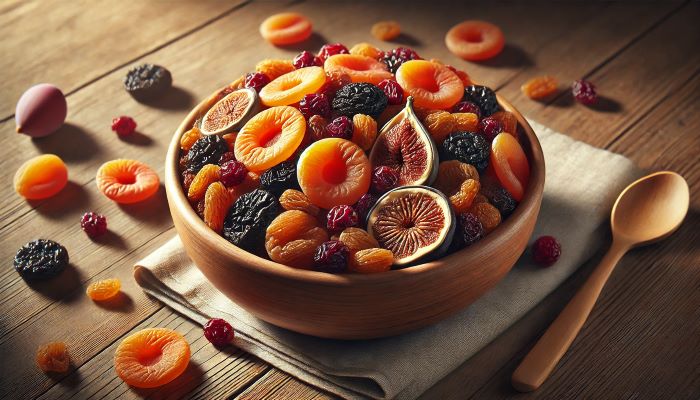
When we discuss dried fruits without sugar added, we are referring to fruits that have been naturally dehydrated free of additional sugar or synthetic sweeteners throughout the process. These are a better and more real snack since they keep their natural sweetness. Sugar-free kinds are just dried to eliminate the water content, leaving concentrated nutrients and flavours left unlike conventional dried fruits that are sometimes laced with sugar to retain their taste or lengthen shelf life.
The ingredients list distinguishes dried fruit free of sugar from those including added sugar. Sugar-free dried fruit is free of preservatives, added sugars, and even synthetic colors, although many marketed dried fruits include these elements. Usually free of sulfites, which are often employed to maintain the color and texture of dried fruits, sugar-free dried fruits are also free from
Among the several kinds of dry fruits often absent from added sugar are unsweetened dried apricots, unsweetened raisins, dried apples, dried pears, and dried cranberries. Always read the label on dried fruit to be sure there is no added sugar; many brands will boldly show “No Sugar Added,” or “100% Natural.”
2. The Health Benefits of Organic Dried Fruit No Sugar Added

For everyone trying to better their diet, organic dried fruits free of sugar provide a variety of health advantages. Choosing organic dried fruit without sugar added has one of the main benefits in that you are avoiding sometimes found in non-organic dried fruits needless chemicals, pesticides, or artificial additions. Usually farmed free of synthetic fertilizers or pesticides, organic dried fruit is a more sustainable and greener choice.
Organic dried fruit also comes devoid of added sugars and preservatives. Although fruit shelf life is often extended using preservatives, over time they may be detrimental to your health. Choosing organic versions will help you avoid these dangerous toxins and choose a more complete, nutrient-dense snack.
Rich in vital nutrients, including fibre, potassium, iron, and other vitamins, organic dried fruits help digestive health, preserve normal blood pressure, and improve general well-being. If you would want to avoid additional sugars in your diet, organic dried fruit without sugar added is the best option to feed your body natural goodness.
3. Low Sugar Dried Fruit: A Perfect Snack for Low-Carb Diets
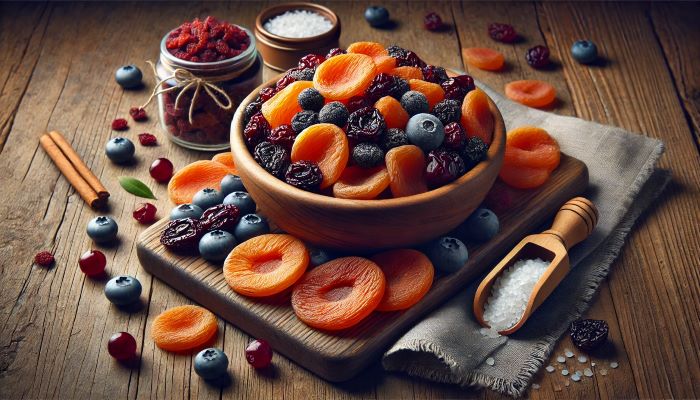
Whether you follow a ketogenic diet or a low-carb one, you understand how crucial it is to pick snacks that please you and fit your dietary goals. Fortunately, low-sugar dried fruit will fit quite nicely in your diet and let you enjoy a great treat while controlling your carbohydrate count. Low-sugar choices give the same delicious texture and sweetness without the carb excess, unlike conventional dried fruits, sometimes filled with additional sugars.
Unsweetened dried apricots, unsweetened dried cranberries, and unsweetened dried blueberries are among the dried fruits low in sugar. Perfect snacks to keep your energy levels steady on a low-carb or ketogenic diet are these naturally low in sugar and high in fibre choices. Furthermore, these fruits’ natural sugars are balanced with fibre, which lowers their glycaemic index than those of fruits including additional sugars.
Low sugar dried fruits not only provide a handy, portable way to fulfil your sweet need without straying your diet, but they also enable you stay on target with your carbohydrate goals. So, grab some low-sugar dried fruit the next time you need a snack on-demand to keep you satiated and energized.
4. High Iron Dry Fruits: Boost Your Energy Naturally

Essential mineral iron is vital for our body since it helps create hemoglobin, which carries oxygen in the blood. Including high-iron dried fruits into your diet is a terrific natural approach to increase your energy levels. Many dried fruits are naturally high in iron, which offers a good, non-caffeinated kind of fuel.
Among the better high-iron, dry fruits are prunes, raisins, and dried figs. Particularly loaded in iron, calcium, and fiber, dried figs are a great alternative for preserving bone health and aiding digestive activity. Excellent sources of iron as well, such as raisins and prunes, help fight tiredness and boost general daily energy levels.
These high-iron dried fruits assist the body’s red blood cell synthesis and preserve a strong immune system in addition to increasing energy. Including them in your diet is a delicious and encouraging approach to naturally feel more energised.
5. Most Nutritious Dried Fruit: A Vitamin Powerhouse

Dried fruit can be a vitamin-packed powerhouse when you’re searching for a snack that’s both tasty and healthy. Although all dried fruits have good nutrients, some kinds stand out for their strong levels of important minerals and vitamins. Among the most nutrient-dense dried fruits are those high in vitamin D, which is vital for maintaining general well-being, immune system, and bone strength.
Dried fruits high in vitamin D include prunes, dried figs, and apricots. Along with vitamin D, these fruits offer a range of additional nutrients, including iron, potassium, and fiber, that together support many body processes.
Apart from vitamin D, dried fruits such as raisins and dates are rich in antioxidants, which assist in reducing oxidative stress and encouraging good aging. For anyone trying to load more nutrients into their diet without the extra sugar and preservatives present in many processed snacks, dried fruits are a great choice because of their mix of vitamins, minerals, and antioxidants.
6. Dried Fruit No Sugar Added: A Great Source of Protein
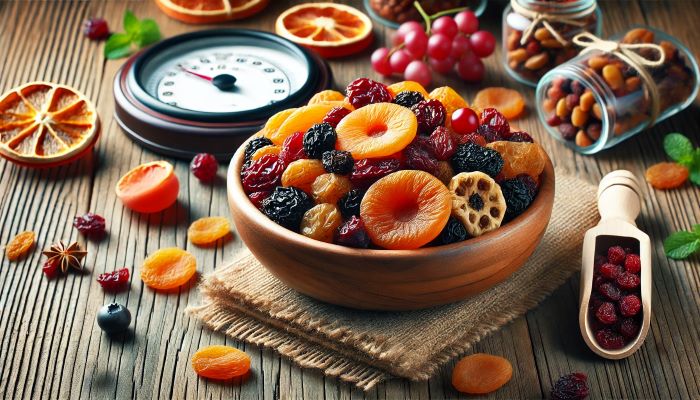
Regarding increasing your protein intake, you could use conventional sources include meat, eggs, or legumes. But did you know that a fantastic source of protein is also dried fruits devoid of sugar added? Many dried fruits—especially nuts and seeds—are high in protein, which supports muscular development, tissue healing, and longer-lasting fullness.
Excellent high-protein dry fruits are almonds, pistachios, and dried apricots, for instance. While dried apricots are loaded with fibre and other vital nutrients, including a reasonable level of protein, almonds and pistachios offer good fats and protein. If you’re trying for a plant-based source of protein especially, these fruits might be a great addition to your diet.
These high-protein dried fruits are a great choice for athletes or anyone trying to maximize muscle recovery following exercises; they will help you keep consistent energy levels. They also make a great snack on demand and are quite portable.
7. Is Dried Pineapple Good for You?
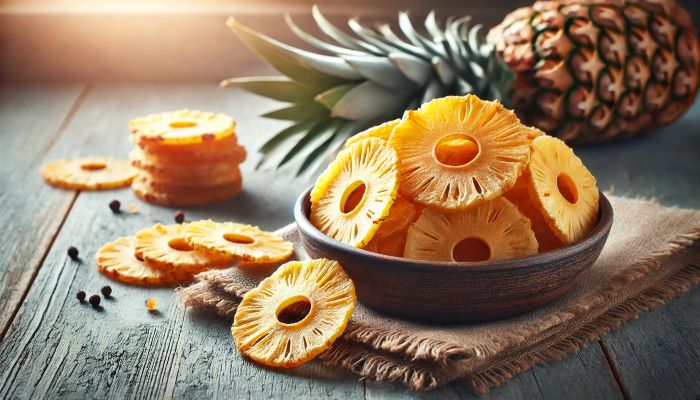
Is dried pineapple good for you? You might be asking. The quick response is indeed yes. When eaten in moderation, dried pineapple may be a quite healthy snack—especially if you go for sugar-free dried pineapple. Dried pineapple’s inherent sweetness and tanginess make for a great treat; it’s also high in vitamin C, which is absolutely vital for immune system support, skin health, and collagen generation.
Dried pineapple also has fibre that helps digestion; the fruit’s natural sugars are less likely to raise blood sugar levels than those added artificially. It also has high antioxidant content, which might aid lower bodily oxidative stress and inflammation.
But since many commercially sold varieties are covered in extra sugar or preservatives, it’s advisable to pick dried pineapple free of sugar. Search for choices marked “no sugar added” to fully enjoy this tropical fruit while cutting back on pointless calories and chemicals.
8. The Best Dried Fruit Brands Offering No Sugar-Added Options
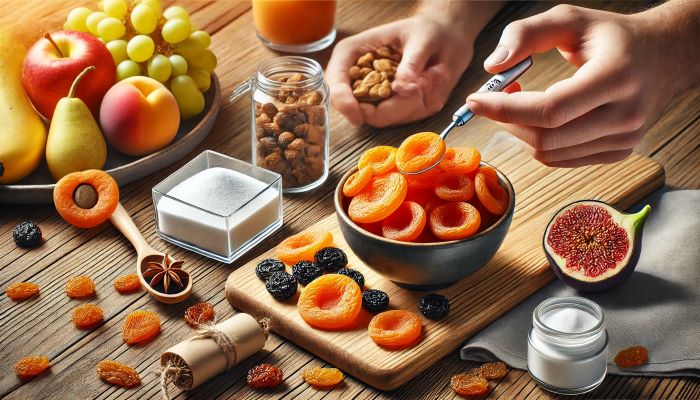
Several companies have jumped in to offer premium, nutritious choices as demand for sugar-free dried fruit rises. Always seek for products labelled “no sugar added, “organic,,” or “100% natural,” while trying to get the best dried fruit. Usually including just the fruit itself, these goods lack artificial preservatives or extra sweets.
Among the greatest dried fruit brands without sugar-added choices are:
Empty Snacks: Bare Snacks, well-known for its basic ingredients, presents a range of dried fruits free of sugar. Made with actual fruit only, they have everything from apple to banana chips.
Made on Nature: This brand specialises on organic, no sugar added dried fruit selections. Grown free from synthetic pesticides or fertilizers, they provide a large variety of dried fruits like apricots, figs, and dates.
Trader Joe’s has many no-sugar-added dried fruit choices including dried mango, unsweetened dried cranberries, and dried apricots for consumers seeking premium dried fruit options.
Always check the label of any brand you are choosing to be sure there are no hidden preservatives or extra sugar. The top products will offer you a complete, hygienic snack fit for your health objectives.
9. Types of Dry Fruits That Help in Weight Management

If you are trying to control your weight, you are aware that good snacks are very important in maintaining active metabolism and stopping overindulgence. The good news is that, when eaten in moderation, dried fruits can be a terrific friend on your weight control quest.
For those trying to lose weight, some kinds of dried fruits are naturally low in calories and sugar. Great low-calorie, fiber-packed snacks are unsweetened dried apricots, unsweetened dried cranberries, and dried figs. Fibre prevents overeating and helps you feel fuller for longer, so lowering cravings.
Apart from low sugar content, dried fruits such as dates and raisins are bursting with natural sugars that give a rapid energy boost when needed, so they are a fantastic snack either before or after exercise. They also aid in the control of blood sugar levels, thereby averting insulin surges that can cause weight increase.
When including dried fruit into your weight control strategy, pay attention to the naturally low-sugar kinds and steer clear of those loaded with sweeteners. Combining dried fruits with a good source of healthy fat—such as nuts or seeds—may also help you stay feeling full for more.
10. How to Incorporate Sugar-Free Dried Fruit Into Your Daily Diet

Including sugar-free dried fruit in your diet is a quick and tasty approach to increase your nutrients without include pointless sugars.
Here are some simple ways you could include dried fruit into your everyday schedule:
morning smoothies For a natural sweetener and extra vitamin and mineral boost, toss some sugar-free dried fruit into your morning smoothie. Smoothies would benefit much from dried apricots, figs, and cranberries.
Create your own homemade trail mix for a nutritious snack on-demand by combining dried fruits free of sugar added with nuts, seeds, and a few dark chocolate chips.
Using dried fruit in your baking calls for For a nutrient-dense and delicious treat, toss unsweetened dried cherries, raisins, or dried apples into muffins, biscuits, or energy bars.
Dried fruits on top of your salads will provide a little sweetener. Salads would benefit much from dried cranberries, apricots, or figs, which give a taste sensation and extra fiber.
Top your yogurt with some no sugar added dried fruit for a tasty and nutrient-dense snack.
Including sugar-free dried fruit into your regular diet can help you to control your sugar intake and enjoy its several health advantages. These fruits provide a natural, healthy substitute for sugary snacks, so helping one to keep a balanced diet.
Conclusion
Ultimately, sugar-free dried fruit presents a variety of unexpected health advantages that can alter your snack behavior. Sugar-free dried fruit is a flexible and good complement to any diet, from increasing your energy levels with high-iron kinds like dried figs to offering a vitamin-rich source of nourishment through selections like dried apricots and prunes.
Remember that selections marked “no sugar added” can help you avoid needless calories and additional sugars while selecting dried fruit. Including these nutritious snacks in your daily schedule will help you move towards a more sustainable and balanced diet.
FAQs:
1. Is dried fruit without sugar added still healthy?
Yes! Dried fruit without sugar added retains all the beneficial nutrients, including fiber, vitamins, and minerals, without the extra sugar. It’s an excellent choice for those looking to reduce their sugar intake.
2. Can sugar-free dried fruit help with weight loss?
Yes, when consumed in moderation, sugar-free dried fruit can aid weight loss. It’s naturally high in fiber, which helps curb hunger and prevent overeating.
3. Are all dried fruits sugar-free?
No, not all dried fruits are sugar-free. Many commercially available dried fruits have added sugars or preservatives. Always check the label for “no sugar added” options.
4. Can I eat dried fruit on a low-carb diet?
Yes, low-sugar dried fruits like dried apricots, cranberries, and blueberries can be included in a low-carb diet. Just be mindful of portion sizes.
5. What is the best sugar-free dried fruit for energy?
Fruits like dried figs and raisins are excellent energy sources due to their high natural sugar content (without added sugars) and fiber, making them a great pre-workout snack.

